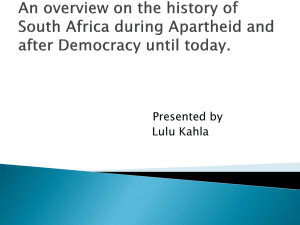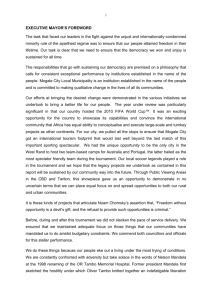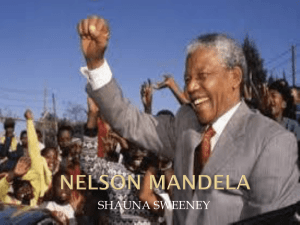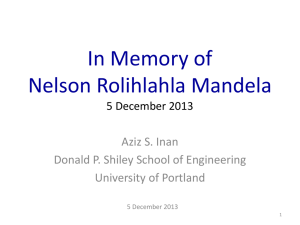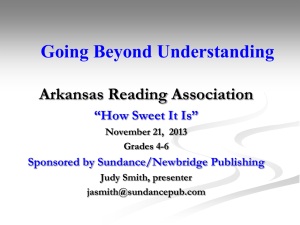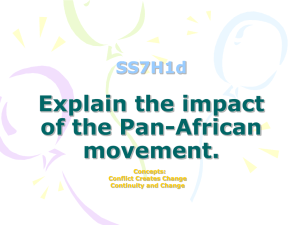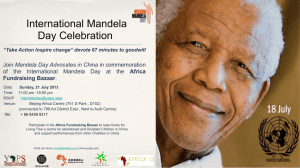Long Walk to Freedom
advertisement
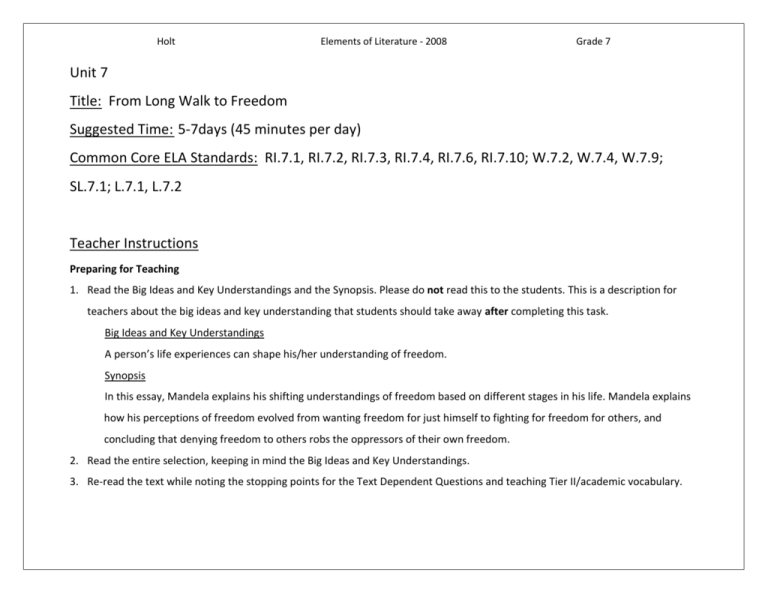
Holt Elements of Literature - 2008 Grade 7 Unit 7 Title: From Long Walk to Freedom Suggested Time: 5-7days (45 minutes per day) Common Core ELA Standards: RI.7.1, RI.7.2, RI.7.3, RI.7.4, RI.7.6, RI.7.10; W.7.2, W.7.4, W.7.9; SL.7.1; L.7.1, L.7.2 Teacher Instructions Preparing for Teaching 1. Read the Big Ideas and Key Understandings and the Synopsis. Please do not read this to the students. This is a description for teachers about the big ideas and key understanding that students should take away after completing this task. Big Ideas and Key Understandings A person’s life experiences can shape his/her understanding of freedom. Synopsis In this essay, Mandela explains his shifting understandings of freedom based on different stages in his life. Mandela explains how his perceptions of freedom evolved from wanting freedom for just himself to fighting for freedom for others, and concluding that denying freedom to others robs the oppressors of their own freedom. 2. Read the entire selection, keeping in mind the Big Ideas and Key Understandings. 3. Re-read the text while noting the stopping points for the Text Dependent Questions and teaching Tier II/academic vocabulary. Holt Elements of Literature - 2008 Grade 7 During Teaching 1. Students read the entire selection independently. 2. Teacher reads the text aloud while students follow along or students take turns reading aloud to each other. Depending on the text length and student need, the teacher may choose to read the full text or a passage aloud. For a particularly complex text, the teacher may choose to reverse the order of steps 1 and 2. 3. Students and teacher re-read the text while stopping to respond to and discuss the questions, continually returning to the text. A variety of methods can be used to structure the reading and discussion (i.e., whole class discussion, think-pair-share, independent written response, group work, etc.) Text Dependent Questions Text-dependent Questions Evidence-based Answers What is the “deep and lasting wound” Mandela mentions in the The deep and lasting wound refers to “decades of oppression first paragraph? What created this “wound”? (pg. 847) and brutality” suffered by the South African people under “the policy of apartheid”; it will take generations to recover from the “profound hurt” (pg. 847). Apartheid is racial segregation that existed in South Africa. (Teachers should make themselves familiar with this concept prior to teaching this selection.) pg. 845 What was the unintended effect of apartheid? Why does It produced leaders or men of extraordinary courage and Mandela call this effect “unintended”? (pg. 847) generosity. (names are listed in the text) Mandela calls this “unintended” because the creation of leaders of a marginalized people was the opposite intention of apartheid. What qualities does Nelson Mandela admire in his fellow He admires courage, wisdom, and generosity. He says they are freedom fighters? Why do you think he says they are “finer “finer and truer” than diamonds he values these qualities more and truer than the purest diamonds”? (pg. 847) than material wealth. What does Mandela mean by “The brave man is not he who Mandela’s definition of courage or bravery is “not the absence does not feel afraid, but he who conquers that fear”? Cite of fear but the triumph over it.” The brave man is not one who evidence from the text to support your answer. (pg. 847) does not feel afraid, but who conquers fear. “I have seen men Holt Elements of Literature - 2008 What does Mandela say about hate? What “was enough to reassure” Mandela that “man’s goodness is a flame that can be hidden but never extinguished”? (pg. 847 - 848) What was the “terrible price” Mandela’s family paid for his “commitment to the struggle”? (pg. 848) According to Mandela, what two obligations does every man have? Why was it “almost impossible” for a man of color to meet those obligations in South Africa? (pg. 848) What does Mandela mean by "my commitment to my people…was at the expense of the people I knew best and loved most”? Cite evidence. (pg. 848) Why does Mandela state “and then one’s voice trails off”? (pg. 848) Describe Mandela’s idea of freedom as a child. (pg. 848) Why does Mandela say that his “boyhood freedom was an illusion”? ( pg. 849) Grade 7 and women give up their lives for an idea…stand up to attacks and torture without breaking, showing a strength…” (pg. 847). Mandela says that it is more natural for humans to love than to hate and that people must be taught to hate. If they can learn to hate, they can be taught to love. He was reassured of man’s goodness in prison “when he would see a glimpse of humanity in one of the guards”. The “terrible price” Mandela’s family paid was being separated from him during the years he spent in prison for supporting the fight for freedom. Mandela states that every man has an obligation to his family and his community. Under apartheid a South African man who tried to fulfill his obligations to his country was punished and inevitably forced to neglect his family because of the secrecy and rebellion involved in the commitment to his country --not serve the current government, but rather, to struggle for freedom. Although he longed to be with his own family, he had to leave them to fight for freedom of the South Africans. It was “as simple and yet as incomprehensible “as the moment a father tells a small child he cannot be with her because “there are other children like you, a great many of them…” Mandela is trying to show how saddened and conflicted he felt in trying to fulfill his obligations to both his family and his country. Mandela said he was born free. Free to run in the fields, free to swim in the stream, free to roast mealies (corn) under the stars, and ride the backs of slow moving bulls. As long as I obeyed my father and customs of my tribe, I was not troubled by the laws of man or God. As a young man, Mandela realized that his freedom had already been taken from him and he began to hunger for it. Holt Elements of Literature - 2008 What kinds of freedom did Mandela want as a student? (pg. 849) What “desire” transformed a frightened young man into a bold one…”? (pg. 849) Give evidence of this transformation. Describe the ways Mandela changed after joining the African National Congress? (pg. 849 – 850) What does Mandela mean when he says “the oppressor must be liberated just as surely as the oppressed”? (pg. 850) Cite evidence from the text to support your response. Why does Mandela end the selection by stating, “my long walk to freedom is not yet ended”? (pg. 850) Grade 7 The freedom Mandela wanted as a young man involved only himself. He wanted the freedom to do as he pleased and to establish himself and enjoy success. He joined the African National Congress; his desire for his own freedom developed into a desire for freedom for all black South Africans. He was a young attorney at this time in his life. The desire for the freedom of his people “transformed a frightened young man into a bold one, drove a law-abiding attorney to become a criminal, turned a family loving husband into a man without a home, and forced a life-loving man to live like a monk” (pg. 849-50). Mandela means that people cannot be lovers of freedom as long as they are denying freedom to others. He points out that oppressors themselves are prisoners “of prejudice and narrowmindedness.” He realized that not only the oppressed but the oppressor needed liberation. In other words, they achieved the freedom to be free and the right to not be oppressed. However, to be free is to not just cast off one’s chains but to live in a way that respects and enhances the freedom of others. Mandela wants people to know that the struggle for freedom must continue: “I have discovered the secret that after climbing a great hill, one only finds that there are many more hills to climb.” “The truth is that we are not yet free; we have merely achieved the freedom to be free, the right not to be oppressed…” Holt Elements of Literature - 2008 Grade 7 Meaning needs to be provided Meaning can be learned from context Tier II/Academic Vocabulary These words require less time to learn These words require more time to learn (They are concrete or describe an object/event/ process/characteristic that is familiar to students) (They are abstract, have multiple meanings, are a part of a word family, or are likely to appear again in future texts) Page 847 – policy Page 847 - brutality Page 847 – profound Page 847 – generations Page 847 – grimmest Page 848 – extinguished Page 848 – isolated Page 848 - comrades Page 849 - abided Page 849 – yearned Page 850 - chains Page 850 – liberated Page 850 – enhanced Page 847 - apartheid Page 847 – defies Page 848 – illusion Page 850 – monk Page 850 – falter Page 850 – vista Page 850 - linger Page 847 – transformations Page 848 – obligations Page 848 - civil Page 848 - commitment Page 848 – incomprehensible Page 849 - hunger Page 849 – potential Page 849 – obstructed Page 849 – transformed Page 850 – prejudice Page 850 - devotion Page 847 – oppression Page 847 – resiliency Page 848 – inclinations Page 848 - humane Page 848 – inevitably Page 848 – twilight Page 848 – existence Page 849 – dignity Page 849 - animated Page 850 - liberate Page 850 - narrow-mindedness Page 850 – virtuous Page 850 – self-sacrificing Page 850 – indivisible Page 850 – oppressor Holt Elements of Literature - 2008 Grade 7 Culminating Writing Task Prompt In Nelson Mandela’s Long Walk to Freedom, Mandela describes his understandings of freedom during his lifetime. Write an essay explaining how Nelson Mandela’s point of view, at different times in his life, affected his understanding freedom. Teacher Instructions 1. Students identify their writing task from the prompt provided. 2. Students complete an evidence chart as a pre-writing activity. Teachers should guide students in gathering and using any relevant notes they compiled while reading and answering the text-dependent questions earlier. Some students will need a good deal of help gathering this evidence, especially when this process is new and/or the text is challenging! Evidence Quote or paraphrase “I was not born with a hunger to be free. I was born free - free in every way that I could know. Free to run in the fields…, free to swim in the clear stream…, free to roast mealies… and ride the broad backs of slow –moving bulls.” “It was only when I began to learn that my boyhood freedom was an illusion, when I discovered as a young man that my freedom had already been taken from me, that I began to hunger for it. …as student, I wanted freedom only for myself, … being able to stay out at night, read what I pleased, and go where I chose.” “But then I slowly saw that not only was I not free, but my brothers and sisters were not free….that is Page number 848 849 Elaboration / explanation of how this evidence supports ideas or argument As a child, Mandela did not hunger for freedom because he was free in every way he knew. As long as he “obeyed his father and abided by the customs of his tribe, he was not troubled by the laws of man or God.” Mandela realized as a student that he was not free in some ways. The freedom he wanted involved only himself, to do as he pleased, and to establish himself and enjoy success. As he joined the African National Congress, he gained a desire for the freedom of his people to Holt Elements of Literature - 2008 when the hunger for my own freedom became the greater hunger for the freedom of my people.” “…transformed a frightened young man into a bold one, that drove a law-abiding attorney to become a criminal, that turned a family-loving husband into a man without a home, that forced a life-loving man to live like a monk.” “When I walked out of prison, that was my mission, to liberate the oppressed and the oppressor both.” 849 849-850 850 Grade 7 live with dignity and self-respect. He could not enjoy what freedoms he had knowing that his fellow South Africans were not free. He realized he could not enjoy the poor and limited freedoms he was allowed when he knew his people were not free. He wanted freedom for all people and came to believe that oppressors are in need of liberation along with the oppressed. Mandela believes that the struggle for freedom cannot end until people live in such a way that other people’s right to freedom is respected. 3. Once students have completed the evidence chart, they should look back at the writing prompt in order to remind themselves what kind of response they are writing (i.e. expository, analytical, argumentative) and think about the evidence they found. (Depending on the grade level, teachers may want to review students’ evidence charts in some way to ensure accuracy.) From here, students should develop a specific thesis statement. This could be done independently, with a partner, small group, or the entire class. Consider directing students to the following sites to learn more about thesis statements: http://owl.english.purdue.edu/owl/resource/545/01/ OR http://www.indiana.edu/~wts/pamphlets/ thesis_statement.shtml. 4. Students compose a rough draft. With regard to grade level and student ability, teachers should decide how much scaffolding they will provide during this process (i.e. modeling, showing example pieces, sharing work as students go). 5. Students complete final draft. Holt Elements of Literature - 2008 Grade 7 Sample Answer In an excerpt from his memoir, Long Walk to Freedom, Nelson Mandela explains his shifting understandings of freedom based on different stages in his life. His perceptions of freedom evolved from wanting freedom for just himself to fighting for freedom for others. He concludes that denying freedom to others robs the oppressors of their own freedoms. As a child, Mandela “was not born with a hunger to be free. I was born free – in every way that I could know” (pg. 848). Clearly, Mandela did not hunger for freedom because he was free in every way that he knew. He was “Free to run in the fields…, free to swim in the clear stream…, free to roast mealies…, and ride the broad backs of slow-moving bulls” (pg. 848). These are all things that young children might associate with the simple freedoms in life. As long as he “obeyed his father” (pg. 848) and “abided by the customs of his tribe” (pg. 849), Mandela viewed himself as totally free. As a young man, Mandela realized that his freedom had already been taken from him, and he then began to hunger for it. As a student, he longed for freedom only for himself such as “being able to stay out at night, read what I pleased, and go where I chose” (pg. 849). Mandela reacted to freedom as many young people might at this stage of his life. He was totally self-centered, focused on how he could establish himself and enjoy his own success. Others’ freedoms were not of paramount concern to him at this time. Later he longed for “the freedom not to be obstructed in a lawful life” (pg. 849). At this point in his life, Mandela realized that not only was he not free, but his brothers and sisters were also not free. He joined the African National Congress which stimulated his desire for his own freedom into a desire for freedom for all black South Africans. This desire “transformed a frightened young man into a bold one, that drove a law-abiding attorney to become a criminal, that turned a family-loving husband into a man without a home, that forced a life-loving man to live life like a monk” (pg. 849-50). Mandela realized that he could not enjoy the limited freedoms he was allowed when he knew his own people were not free. At this stage, he realized “the oppressor must be liberated just as surely as the oppressed” (pg. 850). He became even bolder and more determined that he would never be satisfied until all his people were free. Holt Elements of Literature - 2008 Grade 7 Following his years in prison, Mandela believed that the struggle for freedom cannot end until people live in such a way that other people’s right to freedom is respected. He continues to live in a way that respects and enhances others’ freedom. Although Mandela’s journey for freedom has been long, he knows that rest can only be brief “for with freedom comes responsibilities: I dare not linger, for my long walk is not yet ended” (pg. 850). Additional Tasks 1. Individually or with a partner, pick a person you think displays heroic characteristics such as those depicted by Nelson Mandela. This can be someone you know or someone you read about. Gather as much information as you can about this person, and present it to the class, making explicit connections between the person and Nelson Mandela. If possible, add a multimedia component to your presentation: photos, slides, and video or audio clips can help make your character come alive for your audience. Answer: Answers will vary. 2. Have students read about another prominent figure who fought for freedom such as Martin Luther King, Jr. or Aung San Suu Kyi. Ask students to compare facts they learn about the person with facts about Nelson Mandela that are presented in this selection. Using a graphic organizer such as a Venn diagram, students should chart similarities and differences in the circumstances of the two figures and the ways they responded to the challenges they faced. Answer: Answers will vary. Holt Elements of Literature - 2008 Grade 7 Note to Teacher Due to the high level of vocabulary in this text, make sure to assess students’ levels of understanding. Use various vocabulary strategies to enhance/teach word meanings: Gallery Walk, Word Walls, Frayer’s model, etc. Additional Vocabulary Activity: Vocabulary on the Move Activity (Headbands) This activity is designed to reinforce vocabulary from the selection. Teacher provides words with definitions in matching columns when folded, definitions will be on front and words will be on back. This sheet is for study purposes. Students line up and choose a prepared vocabulary word strip (headband). Without showing the word to the person in front of them, they wrap it around the person’s head. Students then form a circle. The first student is allowed to look at the list of words only. The other students look at the definitions and give one word clues to that student until he/she guesses the word on his/her head. Once guessed, the crown is removed and slipped on his/her arm until the game is over. Variations to this activity can be made as needed. Holt Elements of Literature - 2008 Name __________________________________________________ Grade 7 Date ____________ Long Walk to Freedom 1. What is the “deep and lasting wound” Mandela mentions in the first paragraph? What created this “wound”? (pg. 847) 2. What was the unintended effect of apartheid? Why does Mandela call this effect “unintended”? (pg. 847) 3. What qualities does Nelson Mandela admire in his fellow freedom fighters? Why do you think he says they are “finer and truer than the purest diamonds”? (pg. 847) 4. What does Mandela mean by “The brave man is not he who does not feel afraid, but he who conquers that fear”? Cite evidence from the text to support your answer. (pg. 847) Holt Elements of Literature - 2008 Grade 7 5. What does Mandela say about hate? What “was enough to reassure” Mandela that “man’s goodness is a flame that can be hidden but never extinguished”? (pg. 847 - 848) 6. What was the “terrible price” Mandela’s family paid for his “commitment to the struggle”? (pg. 848) 7. According to Mandela, what two obligations does every man have? Why was it “almost impossible” for a man of color to meet those obligations in South Africa? (pg. 848) 8. What does Mandela mean by "my commitment to my people…was at the expense of the people I knew best and loved most”? Cite evidence. (pg. 848) 9. Why does Mandela state “and then one’s voice trails off”? (pg. 848) 10. Describe Mandela’s idea of freedom as a child. (pg. 848) Holt Elements of Literature - 2008 Grade 7 11. Why does Mandela say that his “boyhood freedom was an illusion”? (pg. 849) 12. What kinds of freedom did Mandela want as a student? (pg. 849) 13. What “desire” transformed a frightened young man into a bold one…”? (pg. 849) Give evidence of this transformation. 14. Describe the ways Mandela changed after joining the African National Congress? (pg. 849 – 850) 15. What does Mandela mean when he says “the oppressor must be liberated just as surely as the oppressed”? (pg. 850) Holt Elements of Literature - 2008 16. Why does Mandela end the selection by stating, “my long walk to freedom is not yet ended”? (pg. 850) Grade 7


